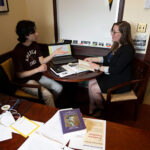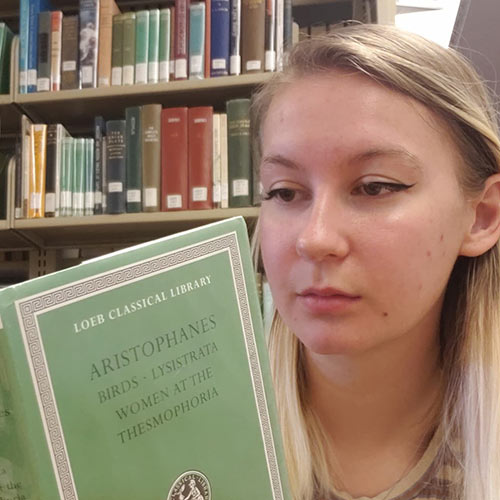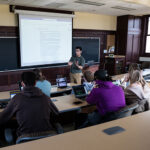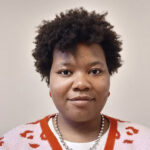
Classical studies major develops open-access digital Greek lexica

A student at The College of Wooster, Katherine Shambaugh ’24 immersed herself in the Classics Department at Cornell University through her APEX Fellowship. A classical studies major, Shambaugh interned at the private Ivy League in Ithaca, New York, under the supervision of Jeffrey Rusten, professor of classics at Cornell University. She spent her time coding to collect data for the website, correct files, and compile useful citations to appear on the online author-specific Greek-to-English lexica.
“This internship helped me decide that I would like to attend graduate school for a Ph.D. The ability to talk to other Ph.D. students about their experiences and passion has encouraged me to take that next step.”
—Katherine Shambaugh ’24
How did you learn about the internship opportunity for your APEX Fellowship?
“The professor I did my sophomore research with introduced me to Jeffery Rusten, professor of classics, from Cornell University, who was working on creating an open-access Lexeis dictionary. This position was a good fit for me because, during my sophomore research, I used the website quite often to get access to not only the Greek text I needed but also the definitions of words I hadn’t seen before. In addition to being very familiar with the website, I also had an interest in computer science that I had never had the chance to try out. This internship gave me the ability to learn a lot about programming and helped me make the decision that I would actually like to minor in computer science.”
What interests you most about the work you did?
“Some of the most interesting things about my job was the ability to see all the layers of files and programs that were needed to get the foundation for the website. I taught myself the programming languages Python and Regular expressions, which were used for finding and replacing characters. Once I finished my Python book, I read Aristophanes, because that was the author we were adding to the website. I worked on tagging some XML files to make sure that the lines of text were being counted correctly. Then, I was thrown into my own programming project where I created codes that found collocation data directly next to words, within three words, and then in an entire sentence. I then worked on citation checking within the XML files to ensure that the Greek was correct or had the ability to tag it when it was incorrect. The most unexpected part was how much I coded. I started with no experience, built skills from the ground up, created a code, collected the data, inserted it into the database, and from there on, it can be viewed by anyone who visits the website in the future.”
Who was your fellowship mentor and how did they help you to succeed in this position?
“My fellowship mentor was Visiting Assistant Professor of Education Ryan Ozar. He helped me succeed by being incredibly supportive. There were many times that I felt like I wasn’t capable of doing the tasks I was assigned but Professor Ozar encouraged me to do my best, and ask for help when I needed it. I took his advice, and it really helped me flourish in my position.”
What are some skills you’ve learned that you see yourself carrying forward in your career?
“I have no doubt that I will carry on my programming skills into my career, as well as the ability to work remotely. Working remotely was difficult at first, and I believe it is an asset along with time management that you have to build up yourself.”
How has the internship helped you to see what’s next for you?
“This internship helped me decide that I would like to attend graduate school for a Ph.D. The ability to talk to other doctorate students about their experiences and passion has encouraged me to take that next step. I have also obtained skills that would be helpful going forward if I would like to get a career in digital humanities, and it has opened more career opportunities for me.”
Posted in Experiential Learning on August 15, 2022.
Related Posts
Related Areas of Study
Classical Studies
The languages, literature, history, myths, philosophies, and archaeology of the Ancient Mediterranean
Major Minor

